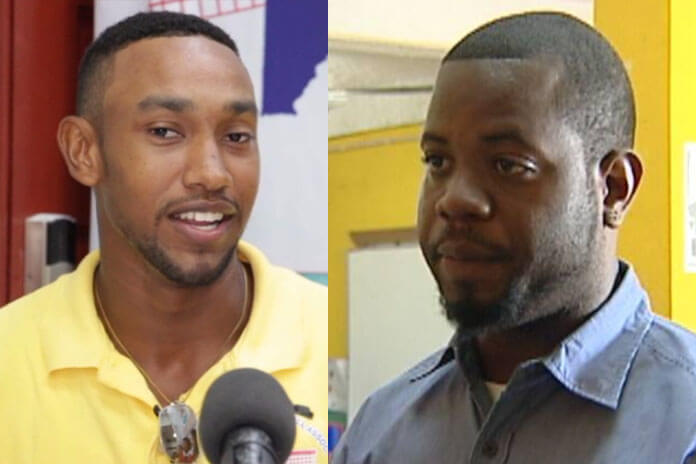BELIZE CITY, Thurs. July 22, 2021– On July 19, Justice Westmin James handed down a ruling in regard to the unlawful profiling lawsuit filed by Greg Nunez and Bryton Codd. After reviewing the two men’s claim, the Supreme Court ruled that police officers who randomly stop-search and in some cases photograph private citizens are violating such citizens’ rights, which are protected by the Constitution. and it further ruled that such actions are arbitrary, oppressive, and unconstitutional.
Last year, Greg Nunez, a social science researcher/analyst, and Bryton Codd, a well-known athlete (national volleyball player) and youth activist, sued the Belize Police Department for unlawfully profiling them in multiple unlawful search incidents. Both claimants asserted that they were not engaged in any suspicious activity or behaviour on the occasions on which they were approached by police officers, yet they were forcibly searched and pictures were taken of their identification cards.
Codd said that he was searched three times in just a matter of two weeks. The initial search that prompted Codd to take the matter to the courts occurred on Mercy Lane. He was on the way to Belize Elementary School’s auditorium to engage in training alongside 4 other members of the national volleyball team. He said that officers stopped them and asked them to exit the vehicle, spread their legs and place their hands behind their heads.
The claimants said that this practice of arbitrarily searching citizens and taking pictures of such citizens without their consent is a violation of a person’s right to privacy and human dignity. Usually, picture-taking of a suspect or detainee is not to be done until a person has been formally charged. This was not the case for Nunez and Codd, and ostensibly many other young black males in Belize.
In a previous interview, Nunez had said that he was well aware that the misdeeds of the Police Department were a violation of his constitutional right. He asserted that there is no justifiable cause for the arbitrary searches. He also noted that the officers who subjected him to the unlawful search felt that they would have been able to carry out their mistreatment of him with impunity. He further noted that he was treated in a hostile manner by the officer when he made subsequent trips to the department.
Following the issuance of the ruling, Judge James ordered the Police Department and the Office of the Attorney General to pay Codd $3,000 in damages and $10,000 for vindicatory damages. Noting that Nunez was targeted as a form of retaliation, the judge ordered that Nunez be paid $5,000 in damages, with an additional $10,000 for vindicatory damages as well.
“The judge concluded that this particular practice was unconstitutional and was a breach of privacy,” said Codd. He noted that sensitive information is seized from persons who are searched and stored in a WhatsApp group, which other officers can access. Codd further noted that the judge issued an injunction for the Police Department to cease this unlawful practice. Justice James saw that it was constitutionally wrong to take pictures of someone without criminally charging them and that the manner in which the photos were being stored did not safeguard the privacy or safety of the persons searched, said Codd.
No sooner than a day after the initial ruling, Nunez said that there was yet another instance of the police failing to uphold the rule of law. Nunez explained that his friend had just stepped out of a barbershop for less than a minute to make a purchase at a nearby grocery store. He was some feet behind the other customers when a police mobile closed in on him with the intent of conducting a search.
Nunez said that when he observed what was taking place, he approached the officers to inform them that his friend had just stepped out of the barbershop and that they were there together. Instead of upholding their rights, the officers insisted that he too be searched as well, Nunez recounted. Nunez said that he then informed the police that he was the claimant in favor of whom the Supreme Court had recently issued a ruling, and it was only at that point that the police desisted, but they had already written his friend’s name and personal information, Nunez said.
Despite this encounter, Nunez claims he will give the Police Department the benefit of the doubt and ample time to inform its members that arbitrary searches are unlawful. He then pleaded to the Minister in charge of policing, Hon. Kareem Musa, to ensure that officers uphold the law. Greg Nunez later stated in a Facebook post, “I will give the BPD the benefit of the doubt that it has not issued a memorandum informing its members of the Supreme Court ruling or has not had sufficient time to make certain policy adjustments. As a citizen and a colleague to the Department, I humbly call on Hon. Kareem Musa to ensure that officers are respectful to the citizens of this country and the rule of law.”
Codd further shared his thoughts on what needs to be done to address the root cause of the unconstitutional practice. He said, “This is a culture that has to be fixed. It is a wrong that has to be made right. It is a cultural shift that has to take place in the internal management of the police. [This dictates] how they conduct proper professional stop and searches. The issue is not with the stop and search, the issue is with the way in which the stop and search is conducted or what prompts reasonable suspicion or gives police reasonable grounds to conduct a stop and search.”

